Case Study Analysis: Ethical and Legal Challenges in Healthcare
VerifiedAdded on 2022/08/22
|8
|2302
|212
Case Study
AI Summary
This case study analyzes three scenarios presenting ethical and legal dilemmas faced by nurses. The first case involves parents refusing routine immunizations for their child due to misconceptions about vaccines, raising concerns about informed consent and the nurse's duty to provide safe care. The second case explores the challenges of treating a fifteen-year-old girl with chlamydia, highlighting issues of patient confidentiality, adolescent consent, and the nurse's role in providing holistic care and sex education. The third case examines a situation of potential domestic violence witnessed by a child, requiring the nurse to balance the child's well-being with legal reporting obligations and providing emotional support. Each case study emphasizes the importance of ethical decision-making, adherence to legal standards, and the provision of comprehensive patient care in challenging healthcare situations. The analysis includes legal constraints, ethical standpoints, and holistic care approaches.
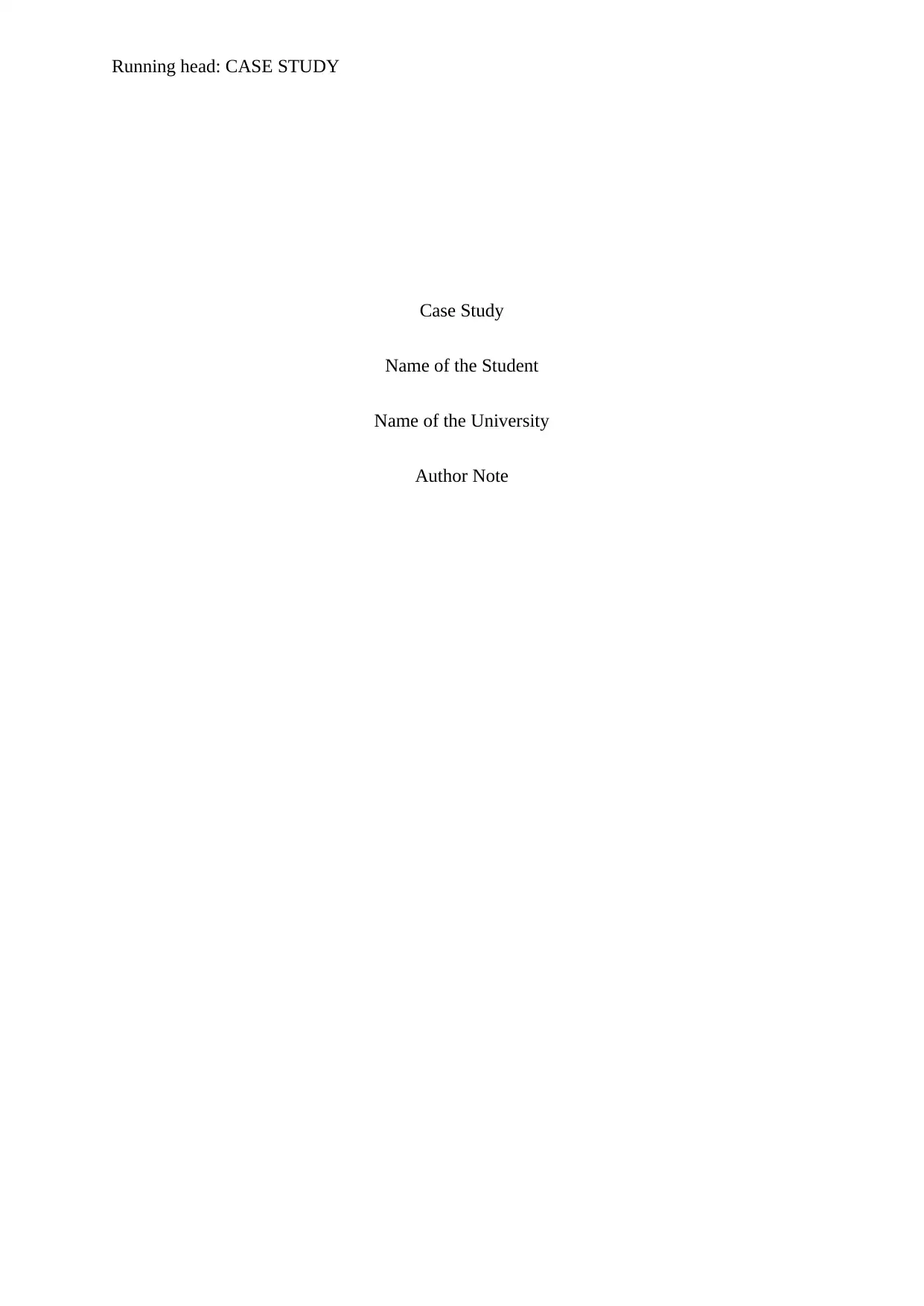
Running head: CASE STUDY
Case Study
Name of the Student
Name of the University
Author Note
Case Study
Name of the Student
Name of the University
Author Note
Paraphrase This Document
Need a fresh take? Get an instant paraphrase of this document with our AI Paraphraser
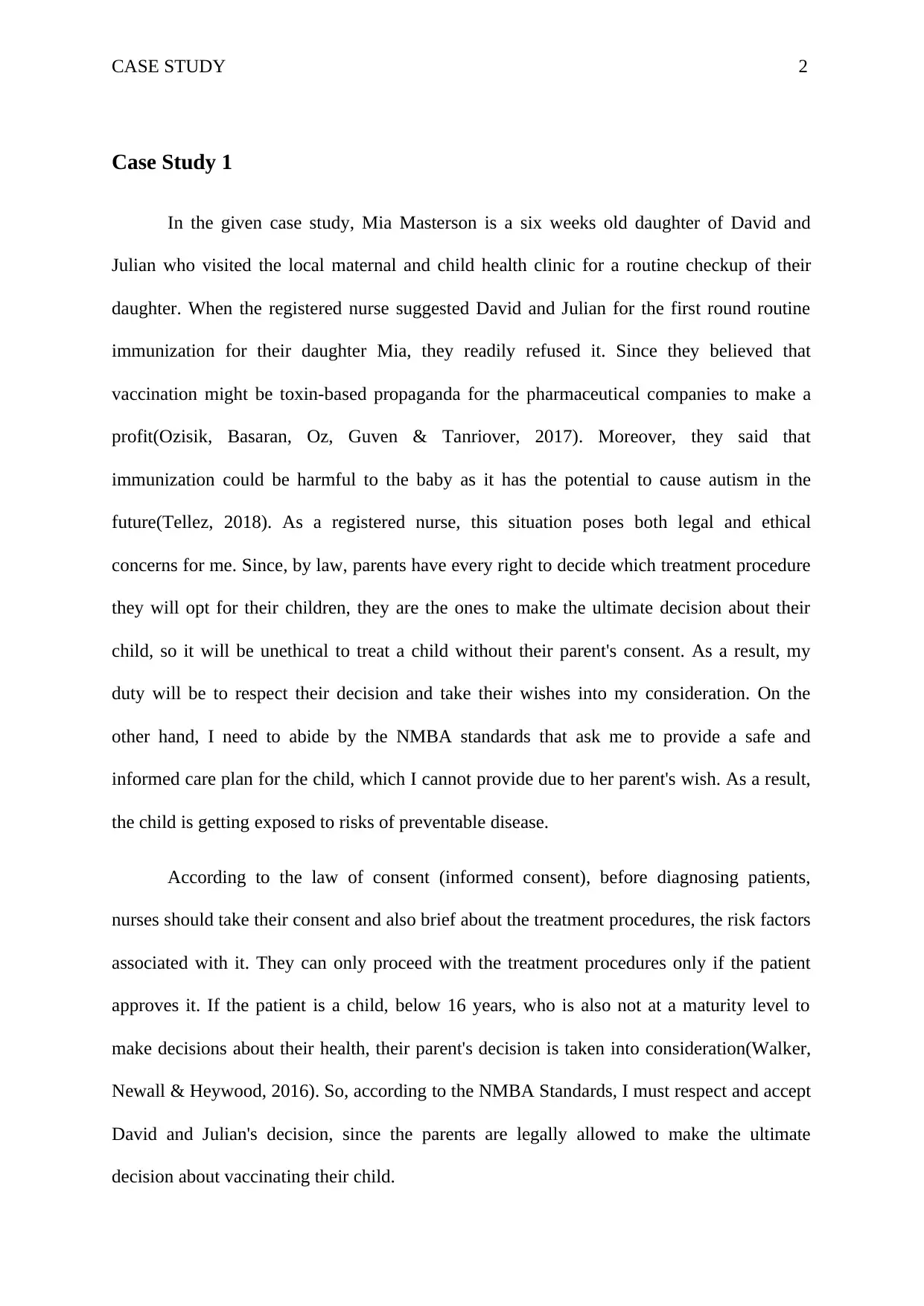
CASE STUDY 2
Case Study 1
In the given case study, Mia Masterson is a six weeks old daughter of David and
Julian who visited the local maternal and child health clinic for a routine checkup of their
daughter. When the registered nurse suggested David and Julian for the first round routine
immunization for their daughter Mia, they readily refused it. Since they believed that
vaccination might be toxin-based propaganda for the pharmaceutical companies to make a
profit(Ozisik, Basaran, Oz, Guven & Tanriover, 2017). Moreover, they said that
immunization could be harmful to the baby as it has the potential to cause autism in the
future(Tellez, 2018). As a registered nurse, this situation poses both legal and ethical
concerns for me. Since, by law, parents have every right to decide which treatment procedure
they will opt for their children, they are the ones to make the ultimate decision about their
child, so it will be unethical to treat a child without their parent's consent. As a result, my
duty will be to respect their decision and take their wishes into my consideration. On the
other hand, I need to abide by the NMBA standards that ask me to provide a safe and
informed care plan for the child, which I cannot provide due to her parent's wish. As a result,
the child is getting exposed to risks of preventable disease.
According to the law of consent (informed consent), before diagnosing patients,
nurses should take their consent and also brief about the treatment procedures, the risk factors
associated with it. They can only proceed with the treatment procedures only if the patient
approves it. If the patient is a child, below 16 years, who is also not at a maturity level to
make decisions about their health, their parent's decision is taken into consideration(Walker,
Newall & Heywood, 2016). So, according to the NMBA Standards, I must respect and accept
David and Julian's decision, since the parents are legally allowed to make the ultimate
decision about vaccinating their child.
Case Study 1
In the given case study, Mia Masterson is a six weeks old daughter of David and
Julian who visited the local maternal and child health clinic for a routine checkup of their
daughter. When the registered nurse suggested David and Julian for the first round routine
immunization for their daughter Mia, they readily refused it. Since they believed that
vaccination might be toxin-based propaganda for the pharmaceutical companies to make a
profit(Ozisik, Basaran, Oz, Guven & Tanriover, 2017). Moreover, they said that
immunization could be harmful to the baby as it has the potential to cause autism in the
future(Tellez, 2018). As a registered nurse, this situation poses both legal and ethical
concerns for me. Since, by law, parents have every right to decide which treatment procedure
they will opt for their children, they are the ones to make the ultimate decision about their
child, so it will be unethical to treat a child without their parent's consent. As a result, my
duty will be to respect their decision and take their wishes into my consideration. On the
other hand, I need to abide by the NMBA standards that ask me to provide a safe and
informed care plan for the child, which I cannot provide due to her parent's wish. As a result,
the child is getting exposed to risks of preventable disease.
According to the law of consent (informed consent), before diagnosing patients,
nurses should take their consent and also brief about the treatment procedures, the risk factors
associated with it. They can only proceed with the treatment procedures only if the patient
approves it. If the patient is a child, below 16 years, who is also not at a maturity level to
make decisions about their health, their parent's decision is taken into consideration(Walker,
Newall & Heywood, 2016). So, according to the NMBA Standards, I must respect and accept
David and Julian's decision, since the parents are legally allowed to make the ultimate
decision about vaccinating their child.
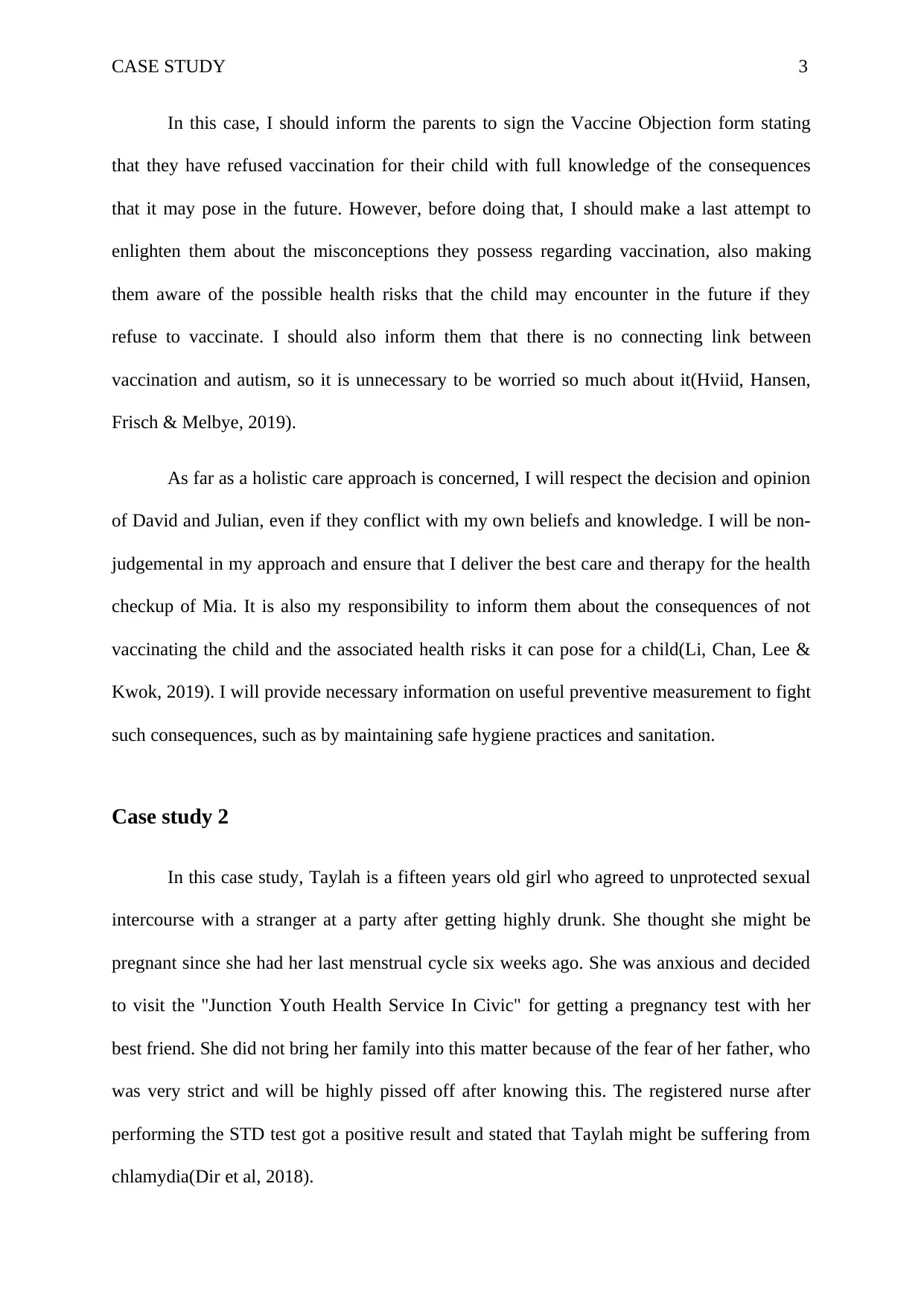
CASE STUDY 3
In this case, I should inform the parents to sign the Vaccine Objection form stating
that they have refused vaccination for their child with full knowledge of the consequences
that it may pose in the future. However, before doing that, I should make a last attempt to
enlighten them about the misconceptions they possess regarding vaccination, also making
them aware of the possible health risks that the child may encounter in the future if they
refuse to vaccinate. I should also inform them that there is no connecting link between
vaccination and autism, so it is unnecessary to be worried so much about it(Hviid, Hansen,
Frisch & Melbye, 2019).
As far as a holistic care approach is concerned, I will respect the decision and opinion
of David and Julian, even if they conflict with my own beliefs and knowledge. I will be non-
judgemental in my approach and ensure that I deliver the best care and therapy for the health
checkup of Mia. It is also my responsibility to inform them about the consequences of not
vaccinating the child and the associated health risks it can pose for a child(Li, Chan, Lee &
Kwok, 2019). I will provide necessary information on useful preventive measurement to fight
such consequences, such as by maintaining safe hygiene practices and sanitation.
Case study 2
In this case study, Taylah is a fifteen years old girl who agreed to unprotected sexual
intercourse with a stranger at a party after getting highly drunk. She thought she might be
pregnant since she had her last menstrual cycle six weeks ago. She was anxious and decided
to visit the "Junction Youth Health Service In Civic" for getting a pregnancy test with her
best friend. She did not bring her family into this matter because of the fear of her father, who
was very strict and will be highly pissed off after knowing this. The registered nurse after
performing the STD test got a positive result and stated that Taylah might be suffering from
chlamydia(Dir et al, 2018).
In this case, I should inform the parents to sign the Vaccine Objection form stating
that they have refused vaccination for their child with full knowledge of the consequences
that it may pose in the future. However, before doing that, I should make a last attempt to
enlighten them about the misconceptions they possess regarding vaccination, also making
them aware of the possible health risks that the child may encounter in the future if they
refuse to vaccinate. I should also inform them that there is no connecting link between
vaccination and autism, so it is unnecessary to be worried so much about it(Hviid, Hansen,
Frisch & Melbye, 2019).
As far as a holistic care approach is concerned, I will respect the decision and opinion
of David and Julian, even if they conflict with my own beliefs and knowledge. I will be non-
judgemental in my approach and ensure that I deliver the best care and therapy for the health
checkup of Mia. It is also my responsibility to inform them about the consequences of not
vaccinating the child and the associated health risks it can pose for a child(Li, Chan, Lee &
Kwok, 2019). I will provide necessary information on useful preventive measurement to fight
such consequences, such as by maintaining safe hygiene practices and sanitation.
Case study 2
In this case study, Taylah is a fifteen years old girl who agreed to unprotected sexual
intercourse with a stranger at a party after getting highly drunk. She thought she might be
pregnant since she had her last menstrual cycle six weeks ago. She was anxious and decided
to visit the "Junction Youth Health Service In Civic" for getting a pregnancy test with her
best friend. She did not bring her family into this matter because of the fear of her father, who
was very strict and will be highly pissed off after knowing this. The registered nurse after
performing the STD test got a positive result and stated that Taylah might be suffering from
chlamydia(Dir et al, 2018).
⊘ This is a preview!⊘
Do you want full access?
Subscribe today to unlock all pages.

Trusted by 1+ million students worldwide
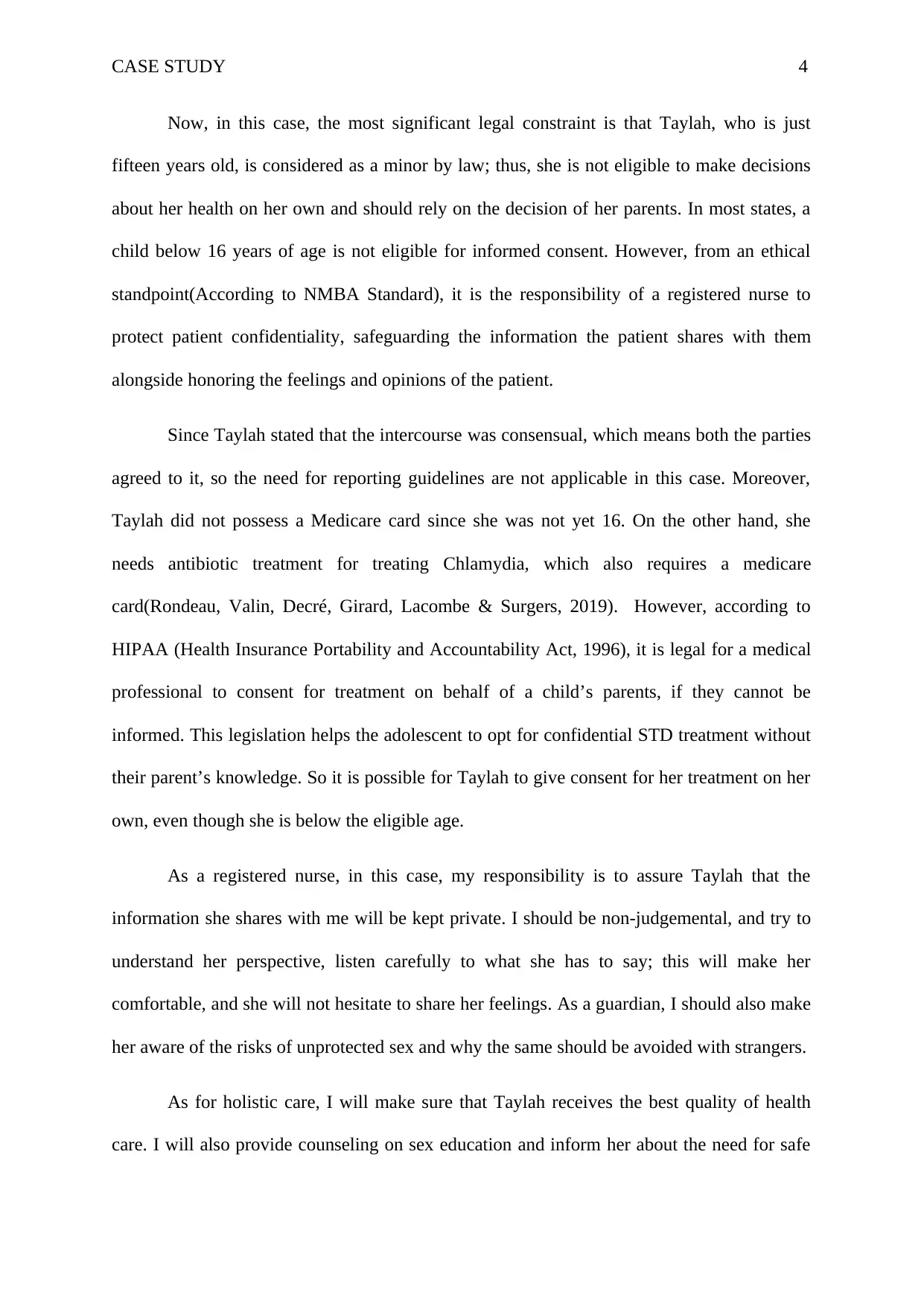
CASE STUDY 4
Now, in this case, the most significant legal constraint is that Taylah, who is just
fifteen years old, is considered as a minor by law; thus, she is not eligible to make decisions
about her health on her own and should rely on the decision of her parents. In most states, a
child below 16 years of age is not eligible for informed consent. However, from an ethical
standpoint(According to NMBA Standard), it is the responsibility of a registered nurse to
protect patient confidentiality, safeguarding the information the patient shares with them
alongside honoring the feelings and opinions of the patient.
Since Taylah stated that the intercourse was consensual, which means both the parties
agreed to it, so the need for reporting guidelines are not applicable in this case. Moreover,
Taylah did not possess a Medicare card since she was not yet 16. On the other hand, she
needs antibiotic treatment for treating Chlamydia, which also requires a medicare
card(Rondeau, Valin, Decré, Girard, Lacombe & Surgers, 2019). However, according to
HIPAA (Health Insurance Portability and Accountability Act, 1996), it is legal for a medical
professional to consent for treatment on behalf of a child’s parents, if they cannot be
informed. This legislation helps the adolescent to opt for confidential STD treatment without
their parent’s knowledge. So it is possible for Taylah to give consent for her treatment on her
own, even though she is below the eligible age.
As a registered nurse, in this case, my responsibility is to assure Taylah that the
information she shares with me will be kept private. I should be non-judgemental, and try to
understand her perspective, listen carefully to what she has to say; this will make her
comfortable, and she will not hesitate to share her feelings. As a guardian, I should also make
her aware of the risks of unprotected sex and why the same should be avoided with strangers.
As for holistic care, I will make sure that Taylah receives the best quality of health
care. I will also provide counseling on sex education and inform her about the need for safe
Now, in this case, the most significant legal constraint is that Taylah, who is just
fifteen years old, is considered as a minor by law; thus, she is not eligible to make decisions
about her health on her own and should rely on the decision of her parents. In most states, a
child below 16 years of age is not eligible for informed consent. However, from an ethical
standpoint(According to NMBA Standard), it is the responsibility of a registered nurse to
protect patient confidentiality, safeguarding the information the patient shares with them
alongside honoring the feelings and opinions of the patient.
Since Taylah stated that the intercourse was consensual, which means both the parties
agreed to it, so the need for reporting guidelines are not applicable in this case. Moreover,
Taylah did not possess a Medicare card since she was not yet 16. On the other hand, she
needs antibiotic treatment for treating Chlamydia, which also requires a medicare
card(Rondeau, Valin, Decré, Girard, Lacombe & Surgers, 2019). However, according to
HIPAA (Health Insurance Portability and Accountability Act, 1996), it is legal for a medical
professional to consent for treatment on behalf of a child’s parents, if they cannot be
informed. This legislation helps the adolescent to opt for confidential STD treatment without
their parent’s knowledge. So it is possible for Taylah to give consent for her treatment on her
own, even though she is below the eligible age.
As a registered nurse, in this case, my responsibility is to assure Taylah that the
information she shares with me will be kept private. I should be non-judgemental, and try to
understand her perspective, listen carefully to what she has to say; this will make her
comfortable, and she will not hesitate to share her feelings. As a guardian, I should also make
her aware of the risks of unprotected sex and why the same should be avoided with strangers.
As for holistic care, I will make sure that Taylah receives the best quality of health
care. I will also provide counseling on sex education and inform her about the need for safe
Paraphrase This Document
Need a fresh take? Get an instant paraphrase of this document with our AI Paraphraser
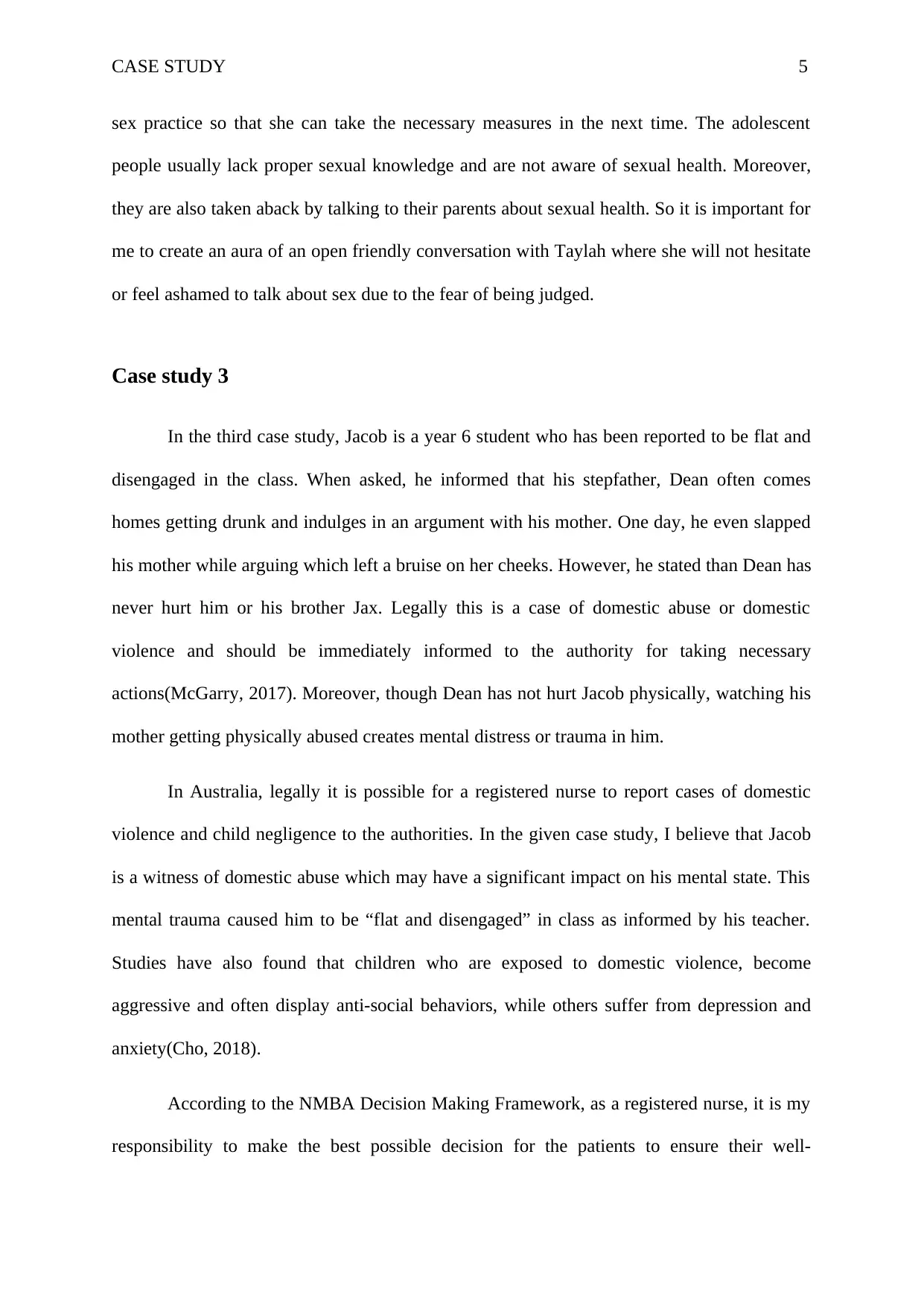
CASE STUDY 5
sex practice so that she can take the necessary measures in the next time. The adolescent
people usually lack proper sexual knowledge and are not aware of sexual health. Moreover,
they are also taken aback by talking to their parents about sexual health. So it is important for
me to create an aura of an open friendly conversation with Taylah where she will not hesitate
or feel ashamed to talk about sex due to the fear of being judged.
Case study 3
In the third case study, Jacob is a year 6 student who has been reported to be flat and
disengaged in the class. When asked, he informed that his stepfather, Dean often comes
homes getting drunk and indulges in an argument with his mother. One day, he even slapped
his mother while arguing which left a bruise on her cheeks. However, he stated than Dean has
never hurt him or his brother Jax. Legally this is a case of domestic abuse or domestic
violence and should be immediately informed to the authority for taking necessary
actions(McGarry, 2017). Moreover, though Dean has not hurt Jacob physically, watching his
mother getting physically abused creates mental distress or trauma in him.
In Australia, legally it is possible for a registered nurse to report cases of domestic
violence and child negligence to the authorities. In the given case study, I believe that Jacob
is a witness of domestic abuse which may have a significant impact on his mental state. This
mental trauma caused him to be “flat and disengaged” in class as informed by his teacher.
Studies have also found that children who are exposed to domestic violence, become
aggressive and often display anti-social behaviors, while others suffer from depression and
anxiety(Cho, 2018).
According to the NMBA Decision Making Framework, as a registered nurse, it is my
responsibility to make the best possible decision for the patients to ensure their well-
sex practice so that she can take the necessary measures in the next time. The adolescent
people usually lack proper sexual knowledge and are not aware of sexual health. Moreover,
they are also taken aback by talking to their parents about sexual health. So it is important for
me to create an aura of an open friendly conversation with Taylah where she will not hesitate
or feel ashamed to talk about sex due to the fear of being judged.
Case study 3
In the third case study, Jacob is a year 6 student who has been reported to be flat and
disengaged in the class. When asked, he informed that his stepfather, Dean often comes
homes getting drunk and indulges in an argument with his mother. One day, he even slapped
his mother while arguing which left a bruise on her cheeks. However, he stated than Dean has
never hurt him or his brother Jax. Legally this is a case of domestic abuse or domestic
violence and should be immediately informed to the authority for taking necessary
actions(McGarry, 2017). Moreover, though Dean has not hurt Jacob physically, watching his
mother getting physically abused creates mental distress or trauma in him.
In Australia, legally it is possible for a registered nurse to report cases of domestic
violence and child negligence to the authorities. In the given case study, I believe that Jacob
is a witness of domestic abuse which may have a significant impact on his mental state. This
mental trauma caused him to be “flat and disengaged” in class as informed by his teacher.
Studies have also found that children who are exposed to domestic violence, become
aggressive and often display anti-social behaviors, while others suffer from depression and
anxiety(Cho, 2018).
According to the NMBA Decision Making Framework, as a registered nurse, it is my
responsibility to make the best possible decision for the patients to ensure their well-
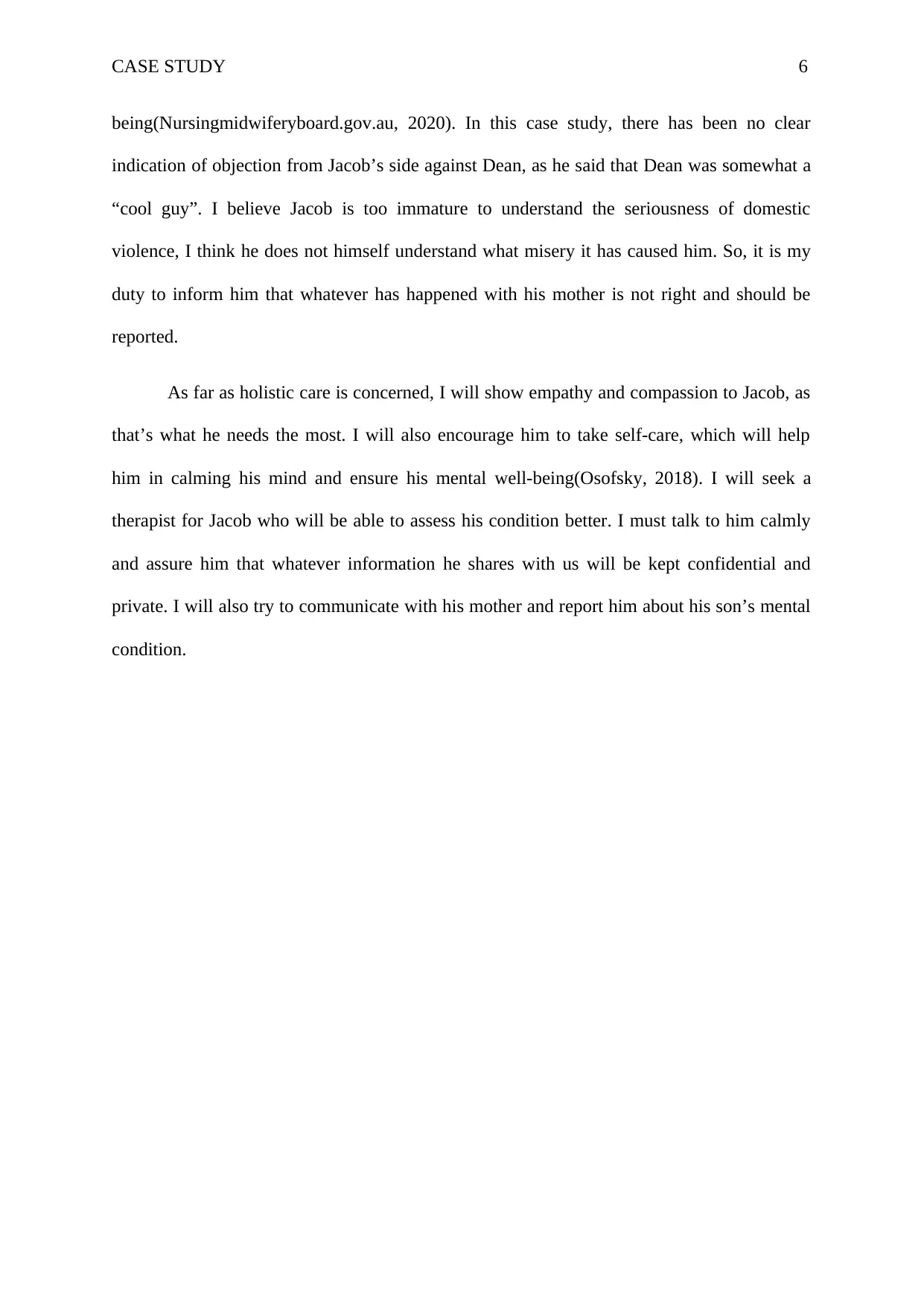
CASE STUDY 6
being(Nursingmidwiferyboard.gov.au, 2020). In this case study, there has been no clear
indication of objection from Jacob’s side against Dean, as he said that Dean was somewhat a
“cool guy”. I believe Jacob is too immature to understand the seriousness of domestic
violence, I think he does not himself understand what misery it has caused him. So, it is my
duty to inform him that whatever has happened with his mother is not right and should be
reported.
As far as holistic care is concerned, I will show empathy and compassion to Jacob, as
that’s what he needs the most. I will also encourage him to take self-care, which will help
him in calming his mind and ensure his mental well-being(Osofsky, 2018). I will seek a
therapist for Jacob who will be able to assess his condition better. I must talk to him calmly
and assure him that whatever information he shares with us will be kept confidential and
private. I will also try to communicate with his mother and report him about his son’s mental
condition.
being(Nursingmidwiferyboard.gov.au, 2020). In this case study, there has been no clear
indication of objection from Jacob’s side against Dean, as he said that Dean was somewhat a
“cool guy”. I believe Jacob is too immature to understand the seriousness of domestic
violence, I think he does not himself understand what misery it has caused him. So, it is my
duty to inform him that whatever has happened with his mother is not right and should be
reported.
As far as holistic care is concerned, I will show empathy and compassion to Jacob, as
that’s what he needs the most. I will also encourage him to take self-care, which will help
him in calming his mind and ensure his mental well-being(Osofsky, 2018). I will seek a
therapist for Jacob who will be able to assess his condition better. I must talk to him calmly
and assure him that whatever information he shares with us will be kept confidential and
private. I will also try to communicate with his mother and report him about his son’s mental
condition.
⊘ This is a preview!⊘
Do you want full access?
Subscribe today to unlock all pages.

Trusted by 1+ million students worldwide
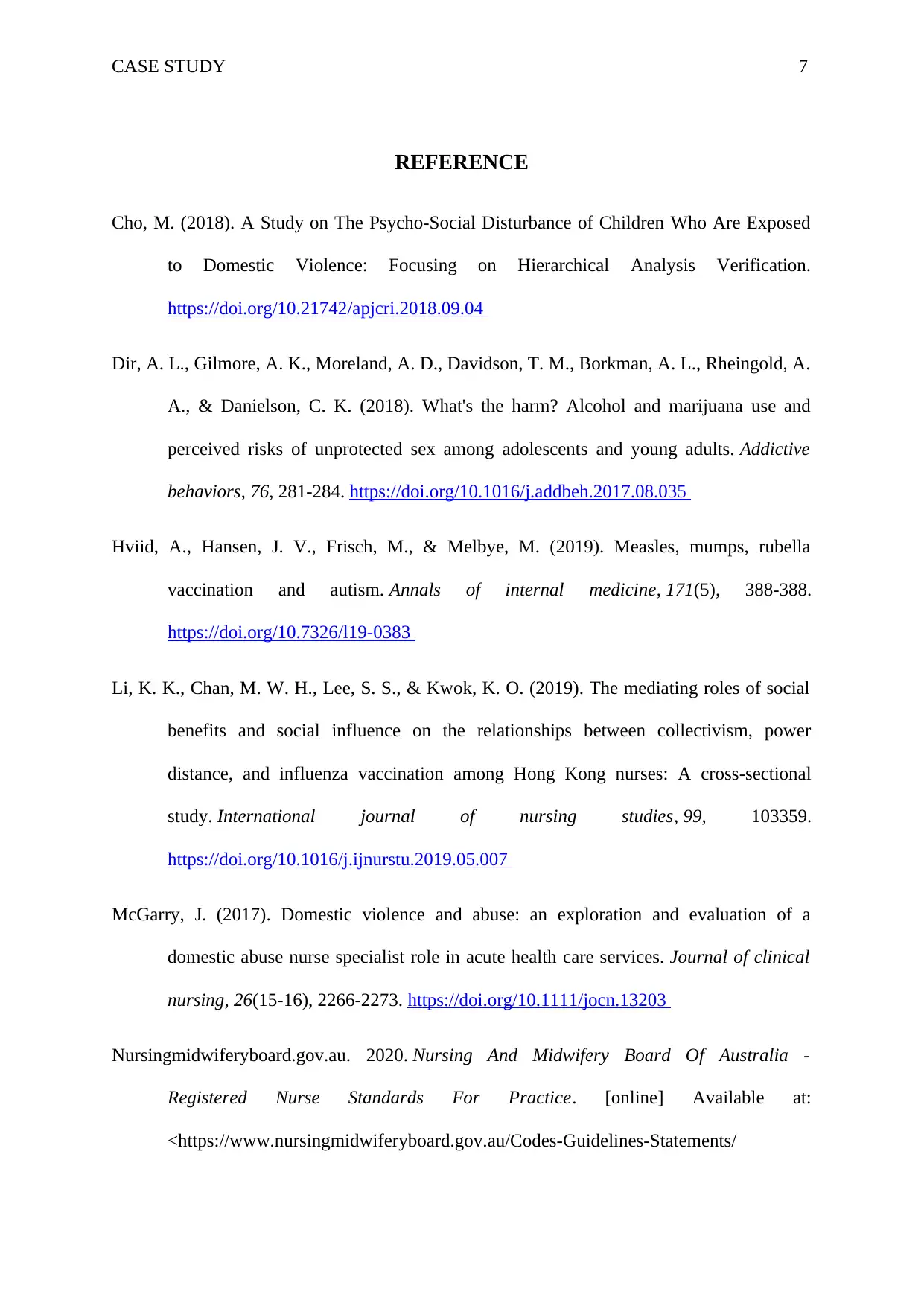
CASE STUDY 7
REFERENCE
Cho, M. (2018). A Study on The Psycho-Social Disturbance of Children Who Are Exposed
to Domestic Violence: Focusing on Hierarchical Analysis Verification.
https://doi.org/10.21742/apjcri.2018.09.04
Dir, A. L., Gilmore, A. K., Moreland, A. D., Davidson, T. M., Borkman, A. L., Rheingold, A.
A., & Danielson, C. K. (2018). What's the harm? Alcohol and marijuana use and
perceived risks of unprotected sex among adolescents and young adults. Addictive
behaviors, 76, 281-284. https://doi.org/10.1016/j.addbeh.2017.08.035
Hviid, A., Hansen, J. V., Frisch, M., & Melbye, M. (2019). Measles, mumps, rubella
vaccination and autism. Annals of internal medicine, 171(5), 388-388.
https://doi.org/10.7326/l19-0383
Li, K. K., Chan, M. W. H., Lee, S. S., & Kwok, K. O. (2019). The mediating roles of social
benefits and social influence on the relationships between collectivism, power
distance, and influenza vaccination among Hong Kong nurses: A cross-sectional
study. International journal of nursing studies, 99, 103359.
https://doi.org/10.1016/j.ijnurstu.2019.05.007
McGarry, J. (2017). Domestic violence and abuse: an exploration and evaluation of a
domestic abuse nurse specialist role in acute health care services. Journal of clinical
nursing, 26(15-16), 2266-2273. https://doi.org/10.1111/jocn.13203
Nursingmidwiferyboard.gov.au. 2020. Nursing And Midwifery Board Of Australia -
Registered Nurse Standards For Practice. [online] Available at:
<https://www.nursingmidwiferyboard.gov.au/Codes-Guidelines-Statements/
REFERENCE
Cho, M. (2018). A Study on The Psycho-Social Disturbance of Children Who Are Exposed
to Domestic Violence: Focusing on Hierarchical Analysis Verification.
https://doi.org/10.21742/apjcri.2018.09.04
Dir, A. L., Gilmore, A. K., Moreland, A. D., Davidson, T. M., Borkman, A. L., Rheingold, A.
A., & Danielson, C. K. (2018). What's the harm? Alcohol and marijuana use and
perceived risks of unprotected sex among adolescents and young adults. Addictive
behaviors, 76, 281-284. https://doi.org/10.1016/j.addbeh.2017.08.035
Hviid, A., Hansen, J. V., Frisch, M., & Melbye, M. (2019). Measles, mumps, rubella
vaccination and autism. Annals of internal medicine, 171(5), 388-388.
https://doi.org/10.7326/l19-0383
Li, K. K., Chan, M. W. H., Lee, S. S., & Kwok, K. O. (2019). The mediating roles of social
benefits and social influence on the relationships between collectivism, power
distance, and influenza vaccination among Hong Kong nurses: A cross-sectional
study. International journal of nursing studies, 99, 103359.
https://doi.org/10.1016/j.ijnurstu.2019.05.007
McGarry, J. (2017). Domestic violence and abuse: an exploration and evaluation of a
domestic abuse nurse specialist role in acute health care services. Journal of clinical
nursing, 26(15-16), 2266-2273. https://doi.org/10.1111/jocn.13203
Nursingmidwiferyboard.gov.au. 2020. Nursing And Midwifery Board Of Australia -
Registered Nurse Standards For Practice. [online] Available at:
<https://www.nursingmidwiferyboard.gov.au/Codes-Guidelines-Statements/
Paraphrase This Document
Need a fresh take? Get an instant paraphrase of this document with our AI Paraphraser
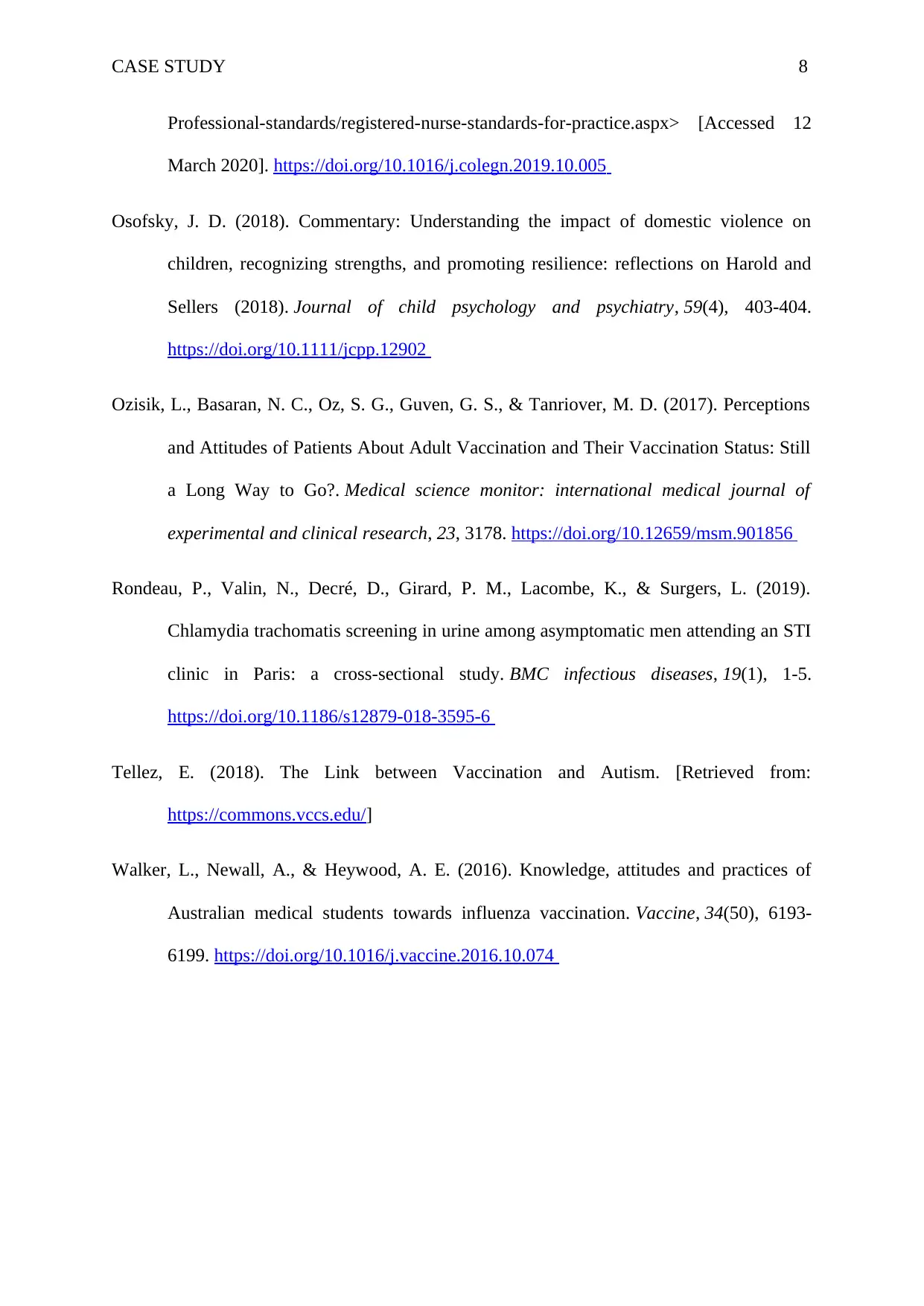
CASE STUDY 8
Professional-standards/registered-nurse-standards-for-practice.aspx> [Accessed 12
March 2020]. https://doi.org/10.1016/j.colegn.2019.10.005
Osofsky, J. D. (2018). Commentary: Understanding the impact of domestic violence on
children, recognizing strengths, and promoting resilience: reflections on Harold and
Sellers (2018). Journal of child psychology and psychiatry, 59(4), 403-404.
https://doi.org/10.1111/jcpp.12902
Ozisik, L., Basaran, N. C., Oz, S. G., Guven, G. S., & Tanriover, M. D. (2017). Perceptions
and Attitudes of Patients About Adult Vaccination and Their Vaccination Status: Still
a Long Way to Go?. Medical science monitor: international medical journal of
experimental and clinical research, 23, 3178. https://doi.org/10.12659/msm.901856
Rondeau, P., Valin, N., Decré, D., Girard, P. M., Lacombe, K., & Surgers, L. (2019).
Chlamydia trachomatis screening in urine among asymptomatic men attending an STI
clinic in Paris: a cross-sectional study. BMC infectious diseases, 19(1), 1-5.
https://doi.org/10.1186/s12879-018-3595-6
Tellez, E. (2018). The Link between Vaccination and Autism. [Retrieved from:
https://commons.vccs.edu/]
Walker, L., Newall, A., & Heywood, A. E. (2016). Knowledge, attitudes and practices of
Australian medical students towards influenza vaccination. Vaccine, 34(50), 6193-
6199. https://doi.org/10.1016/j.vaccine.2016.10.074
Professional-standards/registered-nurse-standards-for-practice.aspx> [Accessed 12
March 2020]. https://doi.org/10.1016/j.colegn.2019.10.005
Osofsky, J. D. (2018). Commentary: Understanding the impact of domestic violence on
children, recognizing strengths, and promoting resilience: reflections on Harold and
Sellers (2018). Journal of child psychology and psychiatry, 59(4), 403-404.
https://doi.org/10.1111/jcpp.12902
Ozisik, L., Basaran, N. C., Oz, S. G., Guven, G. S., & Tanriover, M. D. (2017). Perceptions
and Attitudes of Patients About Adult Vaccination and Their Vaccination Status: Still
a Long Way to Go?. Medical science monitor: international medical journal of
experimental and clinical research, 23, 3178. https://doi.org/10.12659/msm.901856
Rondeau, P., Valin, N., Decré, D., Girard, P. M., Lacombe, K., & Surgers, L. (2019).
Chlamydia trachomatis screening in urine among asymptomatic men attending an STI
clinic in Paris: a cross-sectional study. BMC infectious diseases, 19(1), 1-5.
https://doi.org/10.1186/s12879-018-3595-6
Tellez, E. (2018). The Link between Vaccination and Autism. [Retrieved from:
https://commons.vccs.edu/]
Walker, L., Newall, A., & Heywood, A. E. (2016). Knowledge, attitudes and practices of
Australian medical students towards influenza vaccination. Vaccine, 34(50), 6193-
6199. https://doi.org/10.1016/j.vaccine.2016.10.074
1 out of 8
Related Documents
Your All-in-One AI-Powered Toolkit for Academic Success.
+13062052269
info@desklib.com
Available 24*7 on WhatsApp / Email
![[object Object]](/_next/static/media/star-bottom.7253800d.svg)
Unlock your academic potential
Copyright © 2020–2026 A2Z Services. All Rights Reserved. Developed and managed by ZUCOL.





